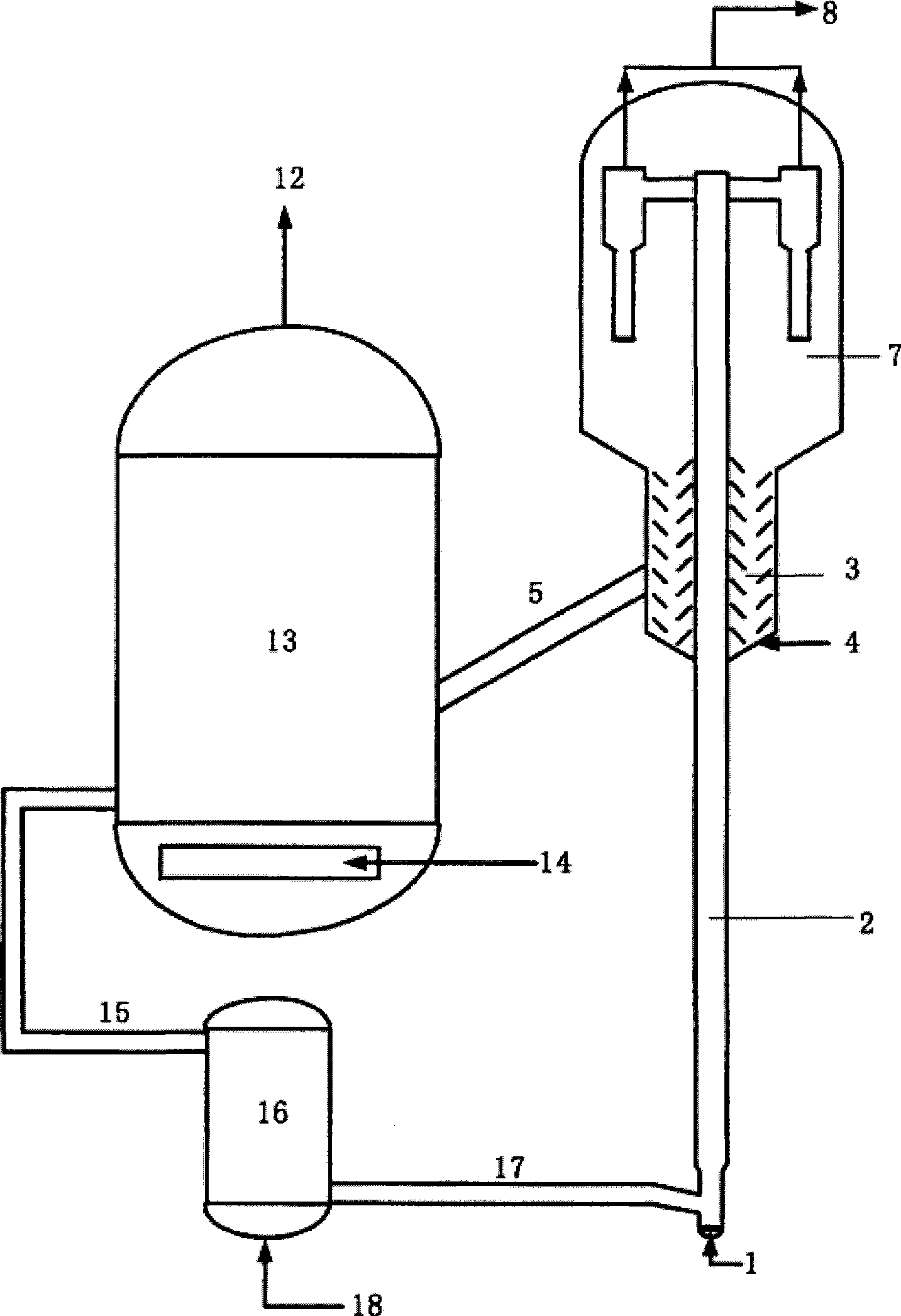Desulphurization sorbent
An adsorbent and zeolite technology, applied in inorganic chemistry, refined hydrocarbon oil, petroleum industry, etc., can solve the problems of gasoline product octane loss and insufficient to achieve deep desulfurization, so as to improve gasoline octane number and adsorbent distribution Uniformity and good desulfurization activity
- Summary
- Abstract
- Description
- Claims
- Application Information
AI Technical Summary
Problems solved by technology
Method used
Image
Examples
preparation example Construction
[0048] The preparation of the adsorbent solid particles used in this embodiment is as follows:
[0049] The main raw materials of the carrier used in this embodiment are as follows:
[0050] C1 # Carrier: 10 kg of pseudo-boehmite (solid content is 64% by weight, industrial product of Shandong Zibo Aluminum Factory, the same below) + 1.0 kg of silica sol (solid content is 25% by weight, produced by Qingdao Lifan Chemical Factory, the same below) +13.1 kilograms of zinc oxide (purity 99.7%, product of Cangzhou Jiewei Chemical Co., Ltd.);
[0051] C2 # Carrier: 4 kilograms of pseudoboehmite+1.0 kilogram of silica sol+6 kilograms of kaolin (solid content is 73% by weight, produced by Suzhou China Clay Company)+10 kilograms of zinc hydroxide (zinc oxide content 71.5%, Peixian Zinc Oxide Factory product);
[0052] C3 # Carrier: 5 kilograms of pseudo-boehmite+4 kilograms of kaolin+2 kilograms of cumulated clay (solid content is 68% by weight, product of Hubei Mingliu Rectorite T...
Embodiment 1-3
[0062] Examples 1-3 illustrate the composition and preparation method of adsorbents containing rare earth zeolite mixtures.
[0063] 7.5 kg of nickel chloride produced by Zhangjiagang Huayi Chemical Co., Ltd., and 8.5 kg of metal salt mixtures of cobalt nitrate and nickel nitrate were formulated into aqueous solutions with a metal ion concentration of 1 to 10 mol / L for use.
[0064] Mix nickel chloride solution with S1 at room temperature # -C1 #Mix the solid particles, add ammonia water with a concentration of 3mol / L while stirring, keep the pH at 7-10, keep stirring until the precipitation is complete, raise the temperature to 90°C and leave it to age for at least 0.5 hours, filter, and wash the filter cake until there is no acid ion A mixture of nickel hydroxide, P-RE-ZSM5, P-REY and alumina carrier material is prepared, and washed with water until there is no chloride ion. After drying at 100-200°C for at least 2 hours, then roasting at 500-800°C for at least 2 hours, cr...
Embodiment 4-5
[0073] Examples 4-5 illustrate the application of rare earth zeolite mixture adsorbents in gasoline desulfurization.
[0074] Using raw gasoline A and B in Table 1 as raw materials, the adsorption and catalytic conversion of raw gasoline raw materials in small fluidized bed reactors were fully contacted with adsorbents ZYS-1 and ZYS-2 respectively. The loading capacity of the adsorbent is 500 grams, and it is reduced for 60 minutes with hydrogen at a temperature of 360° C. and a hydrogen flow rate of 1.5 liters / hour before use. The reaction product, steam and the raw adsorbent mixture are separated in the settler, and the reaction product is separated to obtain gas products and liquid products, while the raw adsorbent is stripped of the hydrocarbon products adsorbed on the raw adsorbent mixture by steam. The stripped adsorbent is regenerated by contacting with heated air, and the regenerated catalyst mixture is recycled after cooling and hydrogen reduction. The test condition...
PUM
| Property | Measurement | Unit |
|---|---|---|
| particle size | aaaaa | aaaaa |
Abstract
Description
Claims
Application Information
 Login to View More
Login to View More - R&D
- Intellectual Property
- Life Sciences
- Materials
- Tech Scout
- Unparalleled Data Quality
- Higher Quality Content
- 60% Fewer Hallucinations
Browse by: Latest US Patents, China's latest patents, Technical Efficacy Thesaurus, Application Domain, Technology Topic, Popular Technical Reports.
© 2025 PatSnap. All rights reserved.Legal|Privacy policy|Modern Slavery Act Transparency Statement|Sitemap|About US| Contact US: help@patsnap.com

